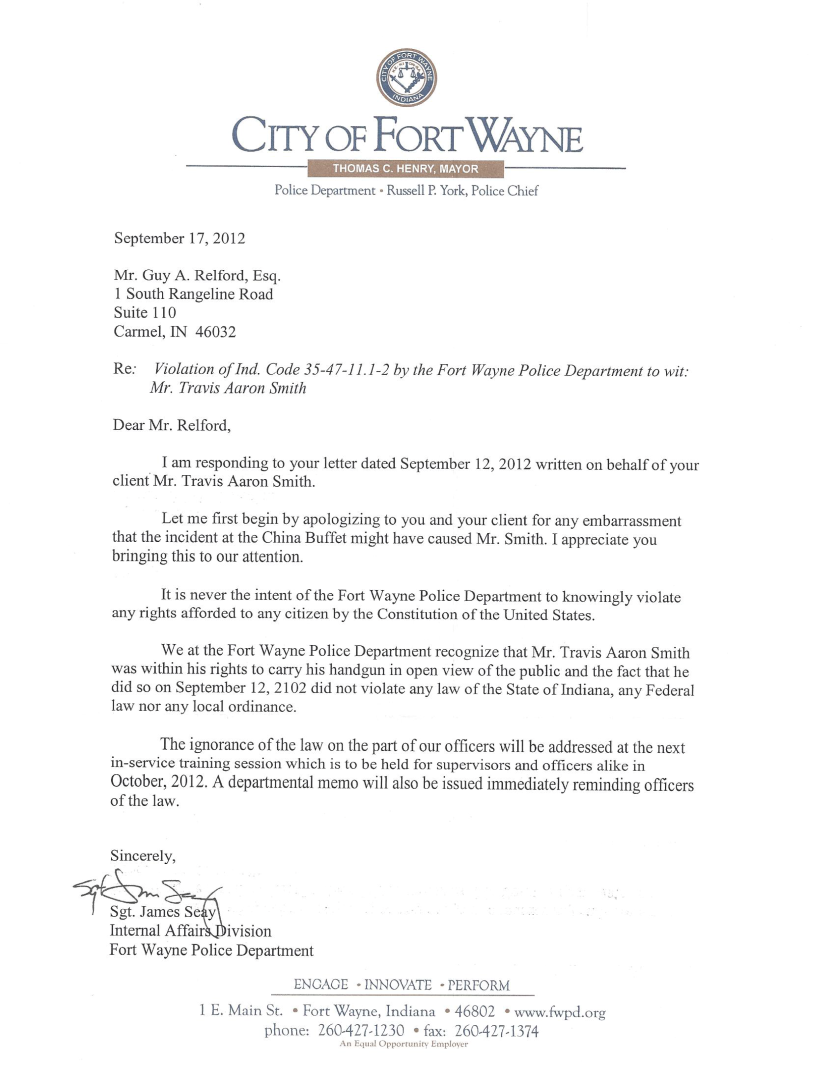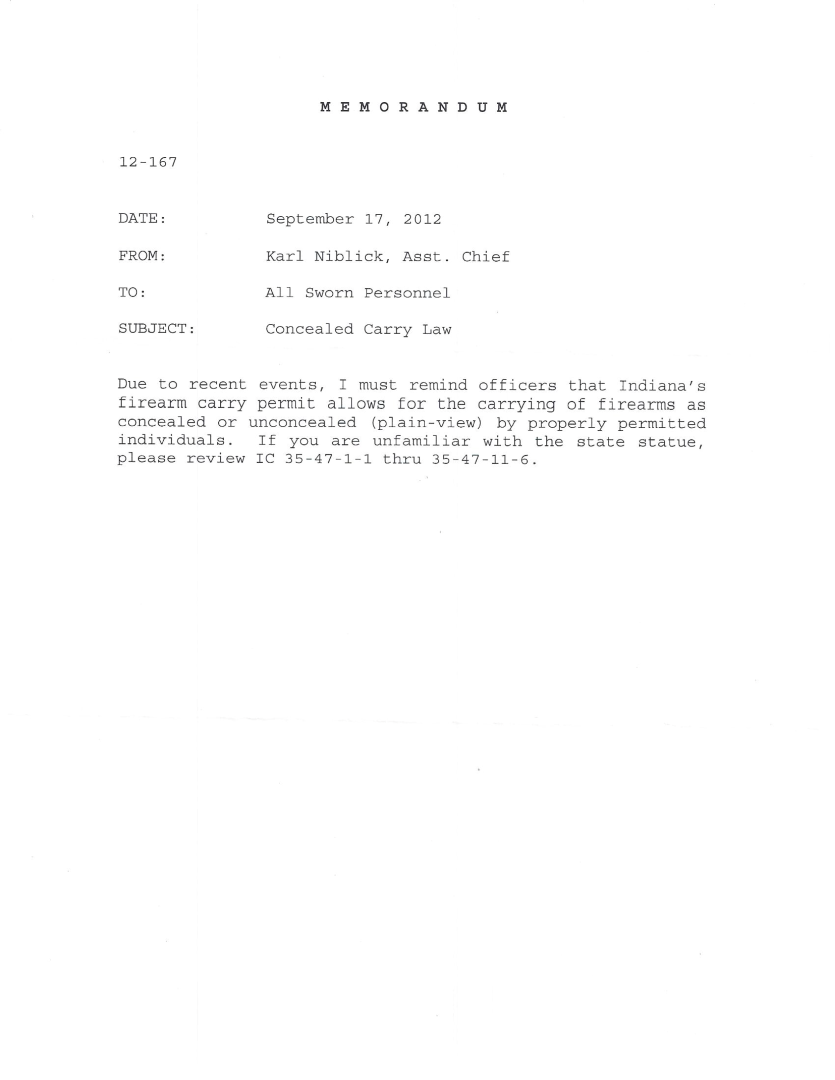This could be considered a news story, I suppose, since it isn't a MI story.
Cliff's notes: guy was jammed up for legally OCing in Indiana. Here is the attorney's letter to the City of Fort Wayne, IN, followed by the reply from the FWPD Internal Affairs Division and a memorandum to all the police who have been ignoring the law. It is a well known fact that the Fort Wayne, IN police have long ignored the right of people to OC. People have posted about it forever, but one guy finally decided to get an attorney to address it.
+++++
September 11, 2012
Via Certified Mail
Return Receipt Requested
Russell P. York
Chief of Police
Ft. Wayne Police Department
1 East Main Street
Ft. Wayne, IN 46803
Re: Violation of Ind. Code §35-47-11.1-2 by the Ft. Wayne Police Department
Dear Chief York:
Please be advised that I represent Mr. Travis Aaron Smith with respect to violations of the Indiana Firearms Preemption Act, Ind. Code §35-47-11.1-1, et. seq., by Officer Terry Holmes and Sgt. Mark Dolezal of the Ft. Wayne Police Department.
Specifically, on Sunday, August 14, 2012, my client was legally carrying a handgun while he and his family were eating a meal at the China Buffet Restaurant near the intersection of Getz Road and Jefferson Boulevard in Ft. Wayne. Mr. Smith holds a valid License to Carry Handgun issued by the Indiana State Police in full compliance with Ind. Code §35-47-2-3 and was entirely within his rights to be in possession of a handgun at the time. As Mr. Smith was eating, Officer Terry Holmes approached him and asked if he was a police officer. When Mr. Smith indicated that he was not, Officer Holmes asked to see Mr. Smith’s “permit,” and Mr. Smith produced his valid License to Carry Handgun.
Officer Holmes then ordered Mr. Smith to conceal his handgun, because “it is illegal to openly carry a handgun in Indiana.” When Mr. Smith politely informed Officer Holmes that he was mistaken – and that no Indiana law required Mr. Smith to conceal his handgun – Officer Holmes ordered Mr. Smith to step outside.
Once outside the restaurant, Officer Holmes repeated the incorrect statement that Indiana has a “concealed carry permit” and stated that Mr. Smith was subject to immediate arrest for openly carrying his handgun. When my client again informed Officer Holmes that he was incorrect, Officer Holmes illegally seized Mr. Smith’s handgun and called his supervisor, Sgt. Dolezal. My client spoke to Sgt Dolezal, who confirmed Officer Holmes’ statement that it is illegal to openly carry a handgun in Indiana. Sgt. Dolezal also repeated that Mr. Smith was subject to immediate arrest, and added that my client’s imminent arrest would adversely affect the status of his License to Carry Handgun with the Indiana State Police. In direct response to the Ft. Wayne Police Department’s threats of arrest, my client complied with Officer Holmes’ illegal order to conceal his handgun.
Contrary to the statements made by Officer Holmes and Sgt. Dolezal, there is absolutely no provision of Indiana law that requires concealment of a legally-carried handgun. Indiana issues a “License to Carry Handgun,” not a “concealed carry permit.” And a holder of a valid License to Carry Handgun is perfectly within his or her rights to carry a handgun either openly or concealed – at his or her discretion.
As a result of the foregoing, it is undisputable that the Ft. Wayne Police Department has violated Indiana law. Ind. Code §35-47-11.1-2 states the following:
Except as provided in section 4 of this chapter, a political subdivision may not regulate:
(1) firearms, ammunition, and firearm accessories;
(2) the ownership, possession, carrying, transportation, registration, transfer, and storage of firearms, ammunition, and firearm accessories; and
(3) commerce in and taxation of firearms, firearm ammunition, and firearm accessories. (Emphasis added.)
The City of Ft. Wayne is clearly a “political subdivision” within the above statute. In addition, by ordering my client to conceal his handgun, the Ft. Wayne Police Department unquestionably imposed a “rule” or a “policy” regarding the “carrying . . . of firearms” in violation of Ind. Code §35-47-11.1-2. (In addition, none of the excpetions contained in §35-47-11.1-4 apply to these circumstances.)
For all of the above reasons, the City of Ft. Wayne is now subject to liability under the Indiana Firearms Preemption Act:
Sec. 5. A person adversely affected by an ordinance, a measure, an enactment, a rule, or a policy adopted or enforced by a political subdivision that violates this chapter may file an action in a court with competent jurisdiction against the political subdivision for:
(1) declarative and injunctive relief; and
(2) actual and consequential damages attributable to the violation.
* * *
Sec. 7. A prevailing plaintiff in an action under section 5 of this chapter is entitled to recover from the political subdivision the following:
(1) The greater of the following:
(A) Actual damages, including consequential damages.
(B) Liquidated damages of three (3) times the plaintiff's attorney's fees.
(2) Court costs (including fees).
(3) Reasonable attorney's fees.
See Ind. Code §35-47-11.1-5 and §35-47-11.1-7.
My client is not a litigious individual and is willing to refrain from initiating a lawsuit if the following actions are taken: 1) The Ft. Wayne Police Department acknowledges that Mr. Smith was within his rights to openly carry his handgun under the circumstances; and 2) the Ft. Wayne Police Department agrees to communicate to all members of the department that “open carry” is not illegal in Indiana (or in Ft. Wayne specifically) and, unless the possession of a firearm is prohibited by state or federal law (or a local regulation that falls within one of the exceptions contained in Ind. Code §35-47-11.1-4), a holder of an Indiana License to Carry Handgun may legally carry a handgun either openly or concealed.
If the Ft. Wayne Police Department refuses to meet my client’s requests, we intend to pursue all available remedies, including those provided by the Indiana Firearms Preemption Act, as set forth above. In this regard, our ultimate goal of educating your officers on the legality of open carry will necessarily be met through the litigation process. However, in the event that your department is willing to take the reasonable steps defined in the preceding paragraph, my client is willing to execute a simple release and will not pursue the matter further. (I also respectfully suggest that taking these actions would benefit the department by avoiding similar incidents in the future – and the likelihood of resulting litigation).
Thank you for your consideration.
Sincerely,
Guy A. Relford
cc: Travis A. Smith
Carol Helton, Esq.
+++++

